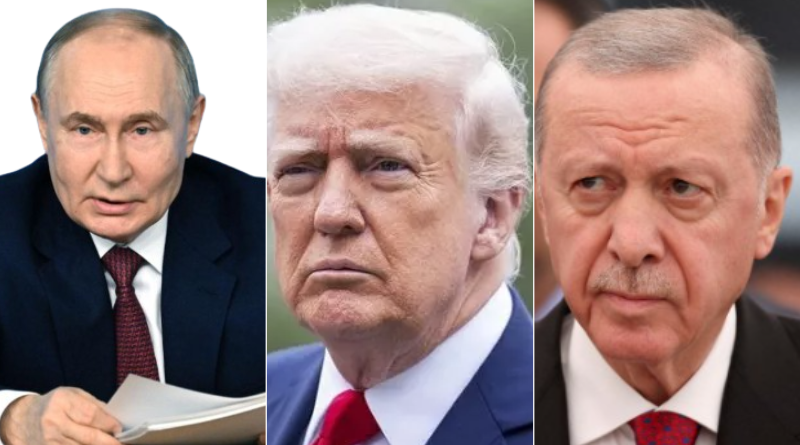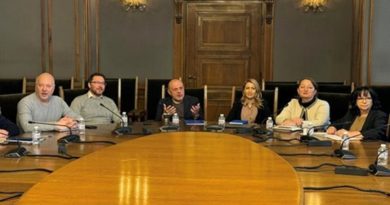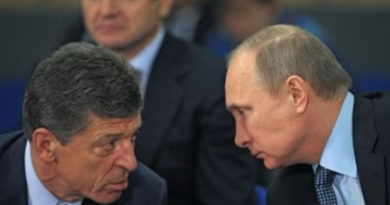Authoritarian Convergence: Bulgaria’s Power Broker and His Turkish Lifeline
In a seemingly offhand remark, former Prime Minister Boyko Borissov revealed the deeper truth behind Bulgaria’s evolving political power structure. In his attempt to deflect attention from his own role in empowering Delyan Peevski, Borissov noted casually: “Today I negotiate with Peevski, tomorrow it’s There Is Such a People (ITN), the next day it’s the Socialists.” This throwaway line exposes a simple, yet powerful reality—Peevski is not merely a player in Bulgarian politics; he is arguably its common denominator and central force. If even Borissov acknowledges this, what does that say about everyone else?
In practice, this is Peevski’s government. It could survive without ITN. It could even function more easily without the Bulgarian Socialist Party. But it cannot exist without Peevski.
Behind the growing visibility of Peevski’s authority lies a critical question few in Bulgaria dare to ask: who benefits from Delyan Peevski’s rise from the foreign policy factors that shape the country’s present and future day? His influence west of the Bulgarian border is minimal. Brussels treats him with suspicion. His attempts to rehabilitate his image through Hungary’s Viktor Orbán and the European far right have been fruitless. His real geopolitical weight lies not in Europe’s West, but in Moscow—and increasingly, Ankara.
Turkey: Peevski’s Geopolitical Lifeline
For Peevski, the Turkish connection is not just pragmatic—it is existential. As the de facto leader of the Movement for Rights and Freedoms (MRF), a party whose legitimacy stems from Bulgaria’s Turkish ethnic minority, he cannot function without Ankara’s silent blessing. In a party built on rigid hierarchy, loyalty networks, and external validation, Turkey’s word—spoken or unspoken—is decisive.
Peevski’s authoritarian grip over the MRF and Bulgaria mimics Erdoğan’s centralized model. Within his party, a personality cult is emerging. “New Beginning,” his political rebranding effort, promotes Peevski as a singular national savior. This cult is gradually spilling into public discourse and captured media.
Support Independent Analysis
Help us keep delivering free, unbiased, and in-depth insights by supporting our work. Your donation ensures we stay independent, transparent, and accessible to all. Join us in preserving thoughtful analysis—donate today!
After the failure of more ethnically representative MRF leaders like Lyutvi Mestan and Mustafa Karadayi—both loyal to Erdoğan but electorally constrained—Ankara shifted to pragmatism. Peevski may lack Turkish ethnic roots, but he offers something far more valuable: real, consolidated power. And for Erdoğan’s realpolitik, power trumps identity every time.
The more power Peevski amasses, the more indispensable he becomes to Erdoğan. Turkey does not seek a legitimate representative; it seeks a partner who controls institutions, economic flows, and political appointments. Peevski’s isolation from the West only strengthens his dependency on Ankara.
Trump steps in
Nominally, the US has Peeavsky listed under the Magnitsky list which remains the main limitation factor for Peevsky’s rise. However, the US has a bigger fish to fry and the Erdogan’s Turkey comes first and defines the range of the possible when it comes to geopolitical power play. Erdogan did most of the legwork for Trump’s moments of glory in hosting the ceremony, hopefully ending the long feud between Armenia and Azerbaijan.
Erdogan-Putin-Trump freudenshaft was instrumental not only in the executions of the TurkStream, bypassing Ukraine, but also in shielding it from legitimate Ukrainian attacks on its Russian infrastructure and more importantly from EU sanctions on Russian gas.
Witkoff’s visit to Moscow and the ensuing Putin-Trump meeting will not cover only Ukraine, but transactional diplomacy highlights – such as how to cooperate in circumventing EU sanctions on Russian gas that has a direct impact of Erdogan’s pretense to act as the alternative gas hub, which rests entirely on increased imports and more importantly on transit of Russian gas via Turkey and then on via Bulgaria.
It should be interpreted as more than coincidence, that during these heavily loaded geopolitically days Stephen Lynch, a US businessman, who came to recent prominence via his attempts to take over Nord Stream, has been visiting Sofia with a secret mission, there is no mention of it in the media, to explore option to secure a US backing for a continued flow of Russian gas into the EU despite EU sanctions.
Where Peevski and Borissov come into the limelight – a role they have perfected during the TurkStream saga..
Turkey as the New Russia for Bulgaria’s Captured Elite
Since Russia’s full-scale invasion of Ukraine, Bulgaria’s elite has reoriented its dependencies. Pro-Russian rhetoric has become toxic, but the relationships endure—only now they are mediated through Turkey. This triangulation centers on immediate cases of transactional diplomacy – past Russian money laundering and three energy vectors: gas, oil, and border business.
- Gas: Turkey is now a conduit for Russian gas into Europe. Even amid looming EU sanctions, a sophisticated laundering system has emerged—blending Russian gas into Turkey’s national mix, manipulating certificates of origin, and exploiting anonymous market segments. Altogether this should bring the imports of Russian gas into the EU up to 30 bcm by via the Markoclar-Strandzha interconnection and the Trans-Balkan pipelie. Today, over 90% of Bulgaria’s gas is still Russian in origin. Peevski and Borissov’s networks in state-owned energy companies ensure this dependency continues.
- Oil: Similar laundering mechanisms exist in the oil trade. Investigations into ship-to-ship transfers of Russian crude off Bulgaria’s Black Sea coast temporarily halted operations, but not for long. As scrutiny increased, imports of refined fuels from Turkey—produced from Russian oil—rose sharply. At the same time, preparations are underway for a Turkish-linked consortium to acquire Lukoil’s Bulgarian assets. Peevski and Borissov have positioned themselves as gatekeepers for this acquisition, solidifying their utility to Erdoğan.
- Border Trade: Bulgaria’s position as an EU external border gives it strategic importance in flows to and from Russia. To avoid direct exposure, Bulgarian politicians use shell companies registered in Turkey, many with links to Russian interests. Erdoğan’s regime permits this proxy trade, and here again, Peevski is increasingly displacing Borissov as the key interlocutor.
For much of Bulgaria’s ruling elite, Turkey has become an anti-Europe pivot —a geopolitical shelter from the discomfort of EU scrutiny. Erdoğan is happy to offer protection and access, provided his partners in Sofia are compliant and dependent. Peevski fits that bill perfectly.
AnErdoğan–Peevski Deal?
For Ankara, Peevski is a functional bargain—not a charismatic leader of the Turkish minority, but a fixer with institutional power. He opens doors to Turkish construction, energy, and infrastructure firms. The scandalous deal with Turkish gas operator BOTAŞ—widely criticized for its opacity—did not result in a single prosecution. Instead, the government scrambled to contain political fallout while protecting Erdoğan’s interests.
Peevski also seeks control over the Bulgarian-Turkish diaspora in Western Europe. Here, collaboration with Turkish intelligence services becomes critical. Just as he manages “border business” for Russian proxies bypassing EU sancions, he aims to dominate diaspora networks—further replacing Ahmed Dogan as Ankara’s preferred partner.
Bulgaria’s own intelligence agencies—especially DANS—have been neutralized or co-opted under Peevski’s direction. Their capacity to counteract foreign influence has been gutted notably vis-à-vis Russian and Turkish services.
Ahmed Dogan’s silence is telling. His role as a strategic Turkish asset has been eclipsed. For Ankara, Peevski is the new Dogan—not because he is admired, but because he delivers.
A Strategic Risk for the West
The more power Peevski accumulates, the more valuable he becomes to Turkey. In a world where pragmatism routinely trumps principle, Erdoğan seeks not allies but instruments—actors willing to trade authority for impunity. Peevski offers precisely that: power, dependency, and a willingness to strike deals without concern for democratic norms.
For Bulgaria and its Western partners, this should be deeply alarming. Every expansion of Peevski’s influence is not just a domestic concern, but a geopolitical threat. Behind the Peevski model lies an increasingly entrenched umbilical cord to Turkey—through which any other autocrats may project its interests. Putin’s and Erdoğan’s authoritarianisms and anti-European ideologies naturally intersect on Bulgarian soil.
Ilian Vassilev




